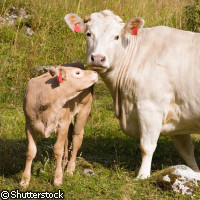European Parliament urges commission to ban animal cloning for food supply
On 3 September the European Parliament adopted a resolution calling for a ban on the cloning of animals for food supply purposes, as well as an embargo on imports of cloned animals and their produce and offspring. The main concerns were threats to animal welfare, genetic diversity, consumer confidence and the image and substance of the European agricultural model. Animal cloning is usually carried out using somatic cell nucleus transfer (SCNT). This process involves inserting genes from the donor animal into an egg that has had its nucleus removed. This egg then forms an embryo, which is transferred to a surrogate mother. Cattle and pigs that have been successfully cloned using SCNT are apparently normal; however, severe adverse health effects and developmental abnormalities are seen in animals when failures occur during the 'reprogramming' phase of cloning. Proponents of animal cloning hope that the technology will allow them to produce high-quality, high-yield and disease-resistant livestock, and that this in turn could lead to a reduction in the need for antibiotics, among other benefits. For example, if an animal showed a natural resistance to bovine spongiform encephalopathy (BSE), cloning that animal might help to eliminate the disease from a herd. The decision against the use of cloning for food supply was reached after weighing these potential benefits against ethical concerns, in particular animal welfare. Because the European Community (EC) and Member States are obliged to 'pay full regard to animal welfare requirements in formulating and implementing agriculture and research policies', the European Food Safety Authority (EFSA) was asked to carry out a comprehensive study of the effects of animal cloning on animal welfare. The European Group on Ethics in Science and New Technologies (EGE) was also asked to provide the Commission with an opinion. The EFSA study concluded that 'the health and welfare of a significant proportion of cloned animals was adversely affected, often severely and fatally'. They found that death and illness in the early stages of life (due to cardiovascular failure, immuno-deficiencies, liver failure, respiratory problems, kidney and musculoskeletal abnormalities) occur more frequently in cloned animals than in sexually produced animals. Also, miscarriage and problems during pregnancy were seen to occur disproportionately in the surrogate mothers of clones. The EGE concluded that cloning animals for food supply was not ethically justified. The resolution passed by Parliament acknowledged that the breeding of fast-growing animals is a concern in terms of animal health and welfare when using selective breeding (citing leg disorders and cardiovascular malfunction in pigs, lameness and mastitis in cattle). There are significant concerns that cloning will result in a higher incidence of similar problems. Additionally, the potential for cloning to 'significantly reduce genetic diversity within livestock populations' was seen as a threat to herd safety, as cloned animals may have unforeseen susceptibility to diseases. The lack of available data on the implications of animal cloning for food supply (the offspring of cloned animals simply haven't been alive long enough) was seen as a major reason to prohibit the use of cloned animals, their produce (e.g. semen, embryos, meat, milk) and offspring in the EU. Accepting the practice of cloning was seen as 'a serious threat to the image and substance of the European agricultural model, which is based on product quality, environment-friendly principles and respect for stringent animal welfare conditions'. The resolution calls for the Commission to prohibit (for food supply purposes) the cloning of animals, the farming of cloned animals or their offspring and the sale of meat or dairy products derived from cloned animals or their offspring. It also calls for an embargo on the import of cloned animals, their produce and offspring (such products are not currently sold in Europe or the rest of the world). This resolution applies only to cloning for food supply purposes. It was adopted by 622 MEPs in favour, with 32 against and 25 abstentions. Androula Vassiliou, EU Commissioner for Health and Food Safety, commented, 'On the basis of the studies conducted and the opinion of EFSA, the Commission will consider whether restrictions must be imposed.'



